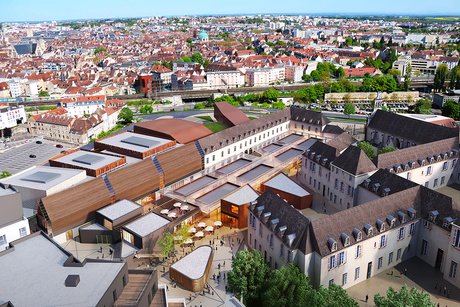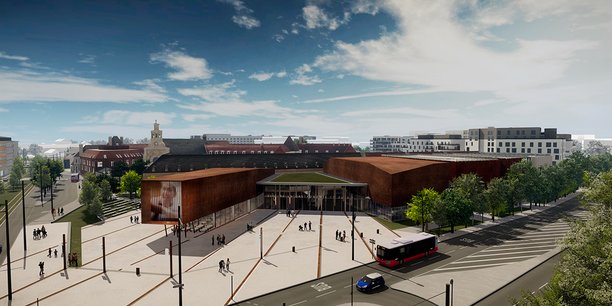The failure of the city of Lyon had cast doubt on the stagnation of the three other similar projects, Tours, Paris-Rungis and Dijon. Despite numerous legal appeals and after four inaugural dates announced, the Burgundy capital sees the end of the tunnel. Opening scheduled for April 2022. François Rebsamen, mayor of Dijon Métropole assured him: “ We are going to do it on a large scale: exhibitions, Ferrandi school, Interprofessional Bureau of Burgundy Wines (BIVB), shops, cinemas. There will be enough to provide visitors with as many experiences as possible from the first day. We found this postponement more appropriate. Better to open at the start of the tourist season, in the open, than in December 2021. »
Following the classification of the gastronomic meal of the French as an intangible heritage of humanity by Unesco, in June 2013, the State had chosen four cities: Tours, Lyon, Paris-Rungis and Dijon, to create the network of Cities of gastronomy, each one having to assert a specific theme. For the capital of the Dukes of Burgundy, located at the first kilometer of the route des grands crus, it will be without hesitation: the enhancement and promotion of vines and wine. The opportunity to create a driving force in partnership with the Jules Guyot institute and the Unesco “Culture and tradition of wines” chair at the University of Burgundy. In 2015, this mission found an additional echo with the inclusion of Climats du vignoble de Bourgogne on the prestigious Unesco list.
The biggest Eiffage site in France (excluding IDF)
Following a call for expressions of interest – otherwise known as without public funding – the Eiffage group was chosen to implement this ambitious project which includes both cultural and tourist facilities (exhibitions, training center, hotel ), commercial spaces (shops, restaurants, bars), an innovation hub (Village by CA), a cinema complex and an eco-district.
« To carry out this project, we have combined the skills of planning, property development and construction. Strong coordination between all these trades is necessary because the site is, in reality, a multiplicity of small projects. », Explains Nicolas Gravit, director at Eiffage Aménagement.
Eight years were needed to rehabilitate the old general hospital to a wasteland in 2015, in the heart of the city of Dijon. ” Not to mention the administrative complexity and the many legal appeals, given the scale of the project – which is the most important for the group outside Île-de-France, the timing was well respected. », Recognizes Nicolas Gravit. One of the main difficulties was to reconcile new construction and existing buildings, some of which are listed as historical heritage. The 70,000 m2 built complex, designed by the architecture firm Anthony Béchu, consists of renovated historic buildings from the 16th, 17th and 18th centuries and resolutely contemporary constructions.
An integrated eco-district
The International City of Gastronomy and Wine (CIGV) will be spread over 6.5 hectares of land. To attract private investors, the community has validated a housing plan that will occupy half of this vast space. An eco-district laid out in the form of an inhabited park on the site of dilapidated buildings built in the 20th century. This set will include subsidized and home ownership accommodation, as well as three “managed” residences for seniors, students and tourists. Why do we speak of an eco-district? ” We have put in place a certain number of devices, in particular to connect the heating network to that of the municipality so that all buildings have a renewable energy supply», Specifies Nicolas Gravit. Real estate developers were ordered to show their white paws with virtuous construction labels. The site itself was the subject of an eco-responsible approach to waste management: “ Not a square meter of excavation left the land. Everything has been recycled, mainly to make the embankments of the future roads», Emphasizes Nicolas Gravit.
The site also took biodiversity into account. At the back of the site, there is a wooded and classified area. ” Eiffage has taken measures to safeguard protected species during the works and for the years to come. And also an initiative to preserve swallows that were already nesting under the roofs of the hospital», Specifies Nicolas Gravit. The great challenge of the architectural firm which designed this eco-district is to find a subtle balance to allow cohabitation between the inhabitants and the “gastronomic shopping village” part of the City. In addition to this eco-district, there are 90 housing units built by the developer François 1er in the buildings of the old hospital.
An ecosystem for startups
The village by CA will be one of the first to set up on the site, next September, before it opens to the public. The network of startup accelerators created by Crédit Agricole in Paris in 2014, and present in all regions, including Dijon, will double its current reception area, from 600 m2 to 1,500 m2. It will have state-of-the-art digital tools.
« All our rooms will benefit from relevant audiovisual equipment to carry out quality videoconferences», Specifies Thomas Dupont, mayor of the village by CA in Champagne-Bourgogne.
Located on the ground floor of a building combining modernity and heritage, with large bay windows, the village space by CA will increase its visibility with visitors. ” The idea is to attract more companies to use our premises for networking and even co-working.
The spaces are designed to be conducive to creativity and create encounters He continues. The premises give directly onto a square where it will be possible to imagine events, conferences, moments of exchange and sharing of experiences and expertise. The mayor is already thinking of “job dating” so that startups can recruit more easily.
« Our goal is to forge links with all the partners present on the site so that start-ups benefit from this ecosystem.», Underlines Thomas Dupont. Why not imagine products designed in the village by CA by start-ups and sold in corners of the City? ” This location in the heart of the International City of Gastronomy and Wine will make it possible to promote agribusiness projects, via the Vitagora and Foodtech network, for example, which regularly receive delegations from around the world.Enthuses the mayor of the village by CA en Champagne Bourgogne.
A permanent animation strategy
In order to make the project economically viable in the long term, the Cité has been designed in such a way as to offer activities throughout the year. An agile and virtuous synergy between the major temporary exhibitions at 1204, an architecture and heritage interpretation center, a permanent exhibition on the Climates of Burgundy at the Sainte-Croix chapel in Jerusalem, an experiential cooking workshop “à la Top chef ”, immersive tasting places and food shops in the gastronomic shopping village, three restaurants, a wine cellar on three levels and over 600 m2 will offer personalized tastings from more than 3,000 references from all international regions (and particularly all of Burgundy). ” It is this dynamic combination of different uses including cinematographic capacity – a Pathé Gaumont cinema with 9 screens will complete the cultural offer of the city center – to attract visitors all year round (families and schools) that will strengthen a strategy of permanent activities and consolidate the success of the City», Assures François Deseille, deputy mayor delegate to the project.

Students: ambassadors of our gastronomy
The International City of Gastronomy and Wine will also be a place dedicated to training and research. Two recognized schools are setting up their branches within the Cité internationale de la gastronomie et du vin in Dijon. First of all, the Ferrandi Paris school, the “Harvard” of gastronomy. Founded in 1920 by the Paris Île-de-France CCI, Ferrandi Paris trains nearly 2,500 young people and 2,000 adults in the fields of gastronomy and “hospitality management”, from CAP to Bac +6. But also, the École des vins de Bourgogne, a benchmark in oenological initiation, a subsidiary of the Bureau interprofessionnel des vins de Bourgogne, an organization representing the interests of the sector.
More than a hundred students from all over the world will join these courses from the start of the 2022 school year. ” These are all ambassadors of our gastronomy who will return to their country », Underlines Jérémie Penquer, project manager for the promotion of major projects in the city of Dijon.


